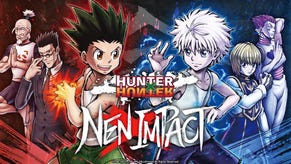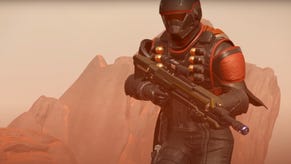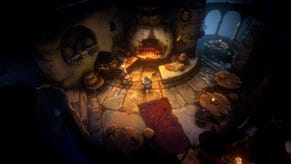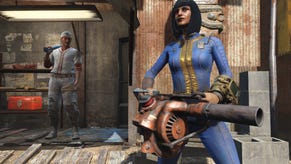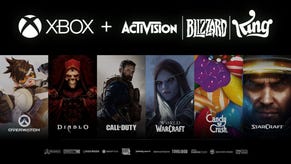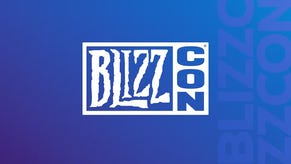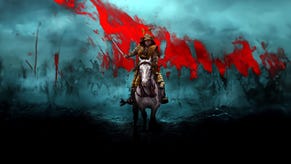The Last of Us: acting out the end of the world
The Last of Us aims to push characterisation and acting in games to new levels. Dave Cook speaks with Naughty Dog and the actors behind Ellie and Tess to learn more about the process, and the role of women in games.
Hands up if you've ever read 'The Zombie Survival Guide' by author Max Brooks. If you haven't, it's a fictional handbook that gives you all of the relevant information to make it through the undead apocalypse. While it isn't based on any real-world events, the tips inside are deadly serious, and as a result are actually pretty terrifying. It gets more harrowing when you start to picture yourself in Brooks' nightmarish vision of mankind's downfall.
You start to think about crucial things like supplies, disease, and how long you'd have to last before either help arrives or the zombies starve. It's not all about 'Pulling a Dawn of the Dead' and holing up inside a shopping mall for a few weeks. There are many complicated factors to consider. Most of us wouldn't survive a few days, let alone a few weeks.
That's the same feeling The Last of Us developer Naughty Dog is trying to convey through its latest PS3 adventure. The studio wants you to get inside the minds of its characters, to feel beaten, to put yourself in the heart of a world gone bad, where people will do anything - even kill their own - in order to survive just one more day.
Gruff survivor Joel and the newly-announced black market owner Tess are both one and the same in that regard. They will stop at nothing to satisfy their own goals, and have each done some miserable, truly despicable things to survive.
But along comes 14 year-old Ellie - a relatively unspoiled person who has lived a sheltered life in a quarantine zone - free from the horrors of the ravaged city streets beyond its borders. She approaches the world with curious optimism and wonder, throwing Tess and Joel's steely demeanour off-kilter.
In this world - where a deadly fungus has wiped out most of the population, and has turned less-fortunate souls into rabid, mindless killers - emotions and personal attachment are flaws that get people killed. But as Joel and Ellie's father-daughter relationship grows, it becomes evident that such emotions can give people a greater reason to survive.
Pen to paper
The Last of Us creative director Neil Druckmann wrote the game's script. To realise a truly fearsome world and characters worth rooting for, he has to make you believe that Joel, Ellie and Tess are real people. The severity of the plot gave Naughty Dog scope to shake-up the perception of women in games, something both he and his studio feel strongly about.
Druckmann gave me a insight into how he approached the characters of Ellie and Tess: “I tried not to be mindful of too many outside influences, which is things like the industry, and how women are portrayed. I believe that should not affect a person's writing. It's about trying to find core truths in your story, and then letting that be the driving force.
“I guess Ellie started first because the core of the story is the relationship of Ellie and Joel, and the journey they go through – both a difficult journey and a journey of their relationship. Off of that I tried to develop characters that reflect back off Joel and Ellie that let us see different aspects of them and their relationship.
“They do some pretty dark stuff. I don’t know how much I can say without spoiling the story, but they’re both in the same boat, and the way they see it, there are other people who would kill them for the supplies they have. They’re going to take the first shot if they need to.”
“Then early on we came up with Tess. When the story starts out she's Joel's partner in this world, in this kind of black market where they deal in contraband, and she is very similar to Joel in that that she's willing to go to any lengths to survive each and every day.”
When approaching Tess, her place as a black market dealer gave Druckmann scope to explore this idea that - even though the world is falling apart - requirements of everyday living such as monetary gain, material possession and even bare-bones necessities such as food and water don't vanish. In fact, they become commodities over which people kill each other.
I suggested to Druckmann that Tess could embody the monopolisation of resources and those material desires we see in normal life.
"Yeah there's an aspect of that, and also that supplies – in this world – mean the difference between living or dying.
"Do you have enough food or not? Enough weapons or not? That's the approach Joel and Tess take in this world, in that the more supplies they can accrue, the longer they can survive, and the more power they have in the quarantine zone.
“They do some pretty dark stuff. I don’t know how much I can say without spoiling the story, but they’re both in the same boat, and the way they see it, there are other people who would kill them for the supplies they have. They’re going to take the first shot if they need to.”
Tess
I asked Annie Wersching - the actor behind Tess, who you may remember as Renee Walker in 24 - about her take on the character and her place in the wider context of the game's plot.
"Her and Joel are partners in this world, but there are certain things she's better at and there are certain things he's better at.
"They work with that and use it to their advantage. She's quite a good negotiator when it comes to making deals, and then Ellie comes into their lives. You then see things a little bit differently in terms of Ellie."
Naughty Dog's desire to create tangible, believable and unique female leads was part of the reason Wersching was drawn to the project, and to the character of Tess.
“I would have to say – and this was also my first audition for a video game – that I was pleasantly surprised at the level of the script, because I didn't really know what I was going to be getting into. For all I knew Tess could have been your stereotypical cliché woman.
"She definitely is not, and just the way characters talk to each other, and the way it was all written was just all very interesting and real. I was pleasantly surprised by all of that, and when I auditioned, I did so with Troy Baker as Joel, who was there with me. It just felt right and good, so I was surprised by that as I wasn't sure what to expect."
Ellie is played by actor Ashley Johnson, and it's clear that Naughty Dog's approach to this particular character is to create a game-changer, someone who forces Joel and Tess to view the world in a new light.
Johnson told me that misconceptions about Ellie being a shallow kid who exists to cause trouble are way off the mark, and that - like all of the flawed and varied characters in The Last of Us - there is more to her than at first appears.
“With Ellie, I know she's 14 but because this is the only world she's ever known. Every day, you have to survive. It's not like she thinks, “Oh, I wake up, what am I going to have for breakfast or who am I going to hang out with today?'
“She's not a normal 14-year-old girl. When I first got the audition and saw the scenes, I could tell she was wise beyond her years and not your average teen. I didn't think the whole time we were shooting it, 'I'm 14, I'm 14'. I honestly haven't been thinking about age.
“For me I just kind of got thrown into it right away like, 'Go put the suit on, get out there and go'. But everybody was helpful – especially Troy who's had so much experience with motion capture – so any questions we've had, he was happy to answer.”
Gaining credibility
All of this effort - the full-body motion capture, the award-winning writing and the attention to character-driven experiences - have certainly put Naughty Dog in good stead. Druckmann believes that the studios work across the Uncharted trilogy has made Hollywood more accessible.
It is now easier for the studio to source actors and get talent on board, and it seems the movie industry at large really is starting to view gaming as a credible career move. The old stigmas of games simply being a play-thing are dissolving thanks to the increase of high-quality story-telling within the industry.
"From our standpoint," he explained, "the Uncharted games won a bunch of awards for performance and story. It just opens doors to more talent, and we've noticed that we're able to find more and more actors who want to do videogames.
“I think as the material becomes more and more sophisticated and as the characters become more interesting, that there's a certain draw there. Even now there are certain actors that won't come near it because there is a certain stigma to games, but I think that's mainly going away.”
“I believe there’s a misconception that if you put a girl or a woman on the cover, the game will sell less. I know I’ve been in discussions where we’ve been asked to push Ellie to the back and everyone at Naughty Dog just flat-out refused.”
The Last of Us continues Naughty Dog's penchant for spinning an engrossing yarn, with characters you want to believe in and support. However, don't go expecting Indiana Jones-inspired adventures and snappy quips here: this is dark stuff, warns Johnson.
“I've worked in films and on TV, but I feel like so much work goes into a video game. I mean, it's been over two years now of people working so hard – all of the animators, all of the developers – and I feel like they should be rewarded for that a little better.
“Some of the stuff that Neil has written has been very dark... Some of what we've shot has been so dark, and has completely ruined my day in a good way, without giving too much away. It hasn't been too hard to get into the mindset of someone who feels beaten down, and that their life is hard, because we remember everything that we've shot, and it's just like, 'Wow, we've been through a lot.'"
Druckmann reverts back to Joel as an example of how - even though the game is set in a fictional environment - players, particularly fathers or mothers will be able to relate to his struggle, and the way he bonds with Ellie during dark times.
“I think in this world you're constantly – on a day-to-day basis – forced to make really difficult decisions where there isn't necessarily a right answer. Over time it can mess you up. At the core of it, this is a father-daughter relationship.
"I know it maybe sounds cheesy but it's a father-daughter love story, and inspiration for that comes from real life. I'm a dad and I just try to think, 'If I was in those situations, how far would I go?' I probably wouldn't last long in this world by the way, because I have no real skills.
“I think the more you can draw from real life, the more you can draw from the art direction, and then your story becomes more real.”
The gender problem
Regardless of one studio's efforts to set a new precedent in game writing and characterisation, Druckmann, Wersching and Jonson - as well as Naughty Dog at large - are growing concerned with the prevalent issue of gender portrayal in games. It is viewed as a stain on the industry that serves to undermine and push back at attempts to raise credibility of the medium.
Johnson pointed to Crystal Dynamic's depiction of a young Lara Croft in its Tomb Raider reboot as an example of how female characters are changing in games.
"As a gamer – and as of course, a female gamer – you definitely have your viewpoints on how women are portrayed in video games.
"Typically they're either over-sexualised, or they're the damsel in distress, or simply there to be a love interest. There may even be one female in a game who's a badass, as opposed to, 'Just another male character'. It does bother me, which is another thing that attracted me to this game, and Naughty Dog games in general.
“You had Uncharted with Elena, and I feel Naughty Dog creates very real characters, especially with The Last of Us. Everybody is real and all of the characters have flaws, which I feel you don’t see a lot in video games.”
"You had Uncharted with Elena, and I feel Naughty Dog creates very real characters, especially with The Last of Us. Everybody is real and all of the characters have flaws, which I feel you don't see a lot in video games.
"What's interesting with Tomb Raider is yes, Lara's vulnerable in the huge trailer they've been showing, and that's cool. But we're seeing characters now that aren't just total badasses or the other way around, that have some vulnerabilities and flaws. I think that's good to see, and it'll change things for the better.”
There have been some concerns over box-art recently - including Ken Levine's admission that the BioShock Infinite cover has been engineered to target 'frat boys' - so I asked the group if they had any suggestions as to why we see so few females on game covers - aside from stereotypical imagery, of course.
Johnson suggested: "I feel like they don't put women on the covers because they're afraid that it won't sell. It's all gamers really know – and I don't want to be sexist by any means – but I get the feeling, generally, that they think game's won't sell as well with a woman on the cover, compared to some badass dude on the front."
"I agree with what Ashley said," Druckmann added. “I believe there’s a misconception that if you put a girl or a woman on the cover, the game will sell less. I know I’ve been in discussions where we’ve been asked to push Ellie to the back and everyone at Naughty Dog just flat-out refused.”
It's refreshing to hear that Naughty Dog stood their ground on the issue of the game's cover, and that it is making conscious efforts to raise the bar for game writing everywhere. Whether or not it will have a widespread impact remains to be seen.
The Last of Us launches May 7, 2013.








